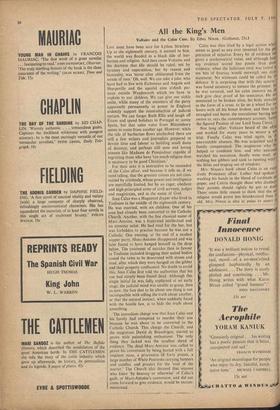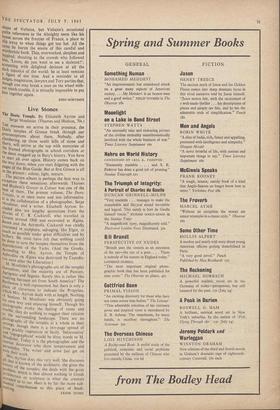All the King's Men
Voltaire and the Calas Case. By Edna Nixon. (Gollancz, 21s.) LirE must have been nice for Lytton Strachey. Up to the eighteenth century, it seemed to him, the world was flooded in a black tide of bar- barism and religion. And then came Voltaire, and the doctrine that life should be ruled, not by tyranny and superstition, but by reason and humanity, was 'never after obliterated from the minds of men.' Oh, well. We can take a joke, who have had to live with Eichmann and Angola and Sharpeville and the squalid nine o'clock pic- tures outside Wandsworth which we have to explain to our children. We can give our sickly smile, while many of the members of the party apparently permanently in power in England ardently support the reintroduction of judicial torture. We can forget Ruth Ellis and laugh off Evans and spend holidays in Portugal or sunny Spain, but that calm voice from Bloomsbury seems to come from another age. However, while the tide of barbarism flows unchecked there are still a few writers and journalists prepared to devote time and labour to building small dams of decency, and perhaps still sane and loving women like Madame de Pompadour capable of regretting those who have 'too much religion than is necessary to be good Christians.'
For their sake it is instructive to be reminded of the Calas affair, and because it tells us, if we need telling, that the greatest crimes are not com- mitted by criminals, whose power and intelligence are mercifully limited, but by an eager, obedient and high-principled army of civil servants, judges and magistrates, and in the name of God.
Jean Calas was a Huguenot draper who lived in Toulouse in the middle of the eighteenth century. He was married, with six children. One of his sons had already been converted to the Catholic Church. Another, with the fine classical name of Marc-Antoine, was a frustrated intellectual and an amateur actor. He had read for the bar, but was forbidden to practise because he was not a Catholic. One evening, at the end of a modest supper party, Marc-Antoine disappeared and was later found to have hanged himself in the shop below. The treatment of suicides then in favour in Toulouse included dragging their naked bodies round the town to be desecrated with stones and mud, after which they were hanged on the gibbet and their property confiscated. No doubt to avoid this, Jean Calas first told the authorities that his son had simply been found dead. Although this single initial lie was fully explained at an early stage, the judicial mind was unable to grasp, then as now, the fact that to lie about one thing is not incompatible with telling the truth about another. or that the natural instinct, when suddenly faced with the hostile law, is to hide the truth about something.
The immediate charge was that Jean Calas and his family had conspired to murder their son because he was about to be converted to the Catholic Church. This charge the Church, and the magistrate David de Beaudrigue, started to prove with painstaking enthusiasm. The only thing they lacked was the smallest shred of evidence. The dead Marc-Antoine was called to prove his conversion by being buried with a full requiem mass, a procession of forty priests, a large number of White Penitents carrying banners and candles, and prayers for the 'soul of the martyr.' The Church also decreed that anyone who knew 'by hearsay or otherwise' of Calas's guilt, or Marc-Antoine's conversion, and did not come forward to give evidence, would be excom- municated.
Calas was then tried by a legal system whi seems as good as any ever invented for the p petration of injustice. Every bit of evidence given a mathematical value, and although hea say evidence scored less points than dir evidence, when the ludicrous total was totted ten bits of hearsay would outweigh one dire statement. No witnesses could be called by defence It is surprising that with this system was found necessary to torture the prisoner. b he was tortured, and his calm answers on tb rack give clear proof of his innocence. He W sentenced to be broken alive, his body stretch in the form of a cross. to lie on a wheel for tvi hours with all his bones broken, and then to strangled and burnt, the executioner having sworn in, says the contemporary account, `befo the figured Passion of our Lord Jesus Christ.' ' Not long after, Voltaire heard of the aff3 and worked for many years to secure a trial. Finally Calas was tried again, in unavoidable absence. He was acquitted and family compensated. The magistrate who b helped to condemn him, and who anxiou watched his execution, finally went mad, se nothing but gibbets and took to running wild the fields and leaping out of windows Mrs. Nixon's book about Camas is an exc sively Protestant affair. Luther had spoken washing his hands in the blood of cardinals a popes, and Calvin thought those who disobey their parents should rightly be put to dea There seems little reason to think that the n religion would prove less bloodstained than old. Mrs. Nixon is also at pains to assert deism of Voltaire, but Voltaire's occasional Polite references to the Almighty seem like his house across the frontier of France, a place to Slip away to when things got too hot. All the same he bursts the seams of this careful and worthwhile book. Thin, overworked, sleepless and insPired; shouting to the crowds who followed him. 'Loons, do you want to see a skeleton?'; screaming with delighted derision at all the dark injustice of the world; he at least remains a figure of our time. And a reminder to all itidges, magistrates, lawyers and Tory parties that, though you may break a man on the wheel with- out much trouble, it is virtually impossible to put him together again.
JOHN MORTIMER



























































 Previous page
Previous page